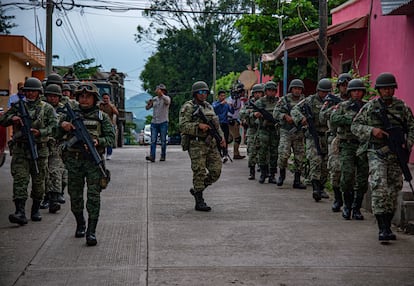Armed conflict in Chiapas spills over the Guatemalan border, damages Mexico’s tourism industry
Travel companies in France, England and Belgium are suspending trips to the Lacandon Jungle in response to increased cartel violence, while in Guatemala, authorities have arrested two members of a Mexican cartel following a shootout with the military


The armed conflict in Chiapas is spreading beyond the state’s borders. While federal and local governments continue to talk about peace, evidence that large sections of Mexico’s poorest state are under the control of drug traffickers is mounting daily, contradicting this official narrative. The Sinaloa Cartel and the Jalisco New Generation Cartel (CJNG, in its Spanish acronym), the two most powerful criminal groups in Mexico, are fighting a turf war for control over this southern region in a conflict that has taken an especially heavy toll on the civilian, peasant and indigenous population. The consequences of the violence are also beginning to spread to the international sphere: tourist agencies in France, the United Kingdom and Belgium have decided to stop taking clients to the Lacandon Jungle, while across the border in neighboring Guatemala, authorities have reported incursions and gun battles between members of the CJNG and government forces.
This week, ATC Touroperadores, which describes itself as “the first tourist agency operating in Chiapas since 1984,” announced that the “French, British and Belgian agencies that we represent have decided to stop taking tourists anywhere in the Lacandon area,” one of the state’s main attractions. In justifying its decision, the company said that “for more than three months, the tourism environment has been drastically disrupted in certain regions of Chiapas” as a result of “situations that took place in the past two weeks involving three groups of French tourists,” though the agency did not providing any further details about these “situations.”
However, in the same statement, which was shared on the company’s social media, ATC mentions incidents involving foreign tourists in which company vehicles were forced to advance through “rock-throwing and gunfire. In the statement, the company also refers to threats and extortion by organized crime: “Armed men, armed to the teeth, will say: ‘You can pass through here with tourists, but you have to pay,’ and then they tell you what time you can enter Bonampak [an archaeological site] — in their cars, of course, which you also pay for — and then tell you that you also have to pay a security guard, with the title of tourist guide, who accompanies you the whole time, and then they ask you for a thousand pesos and you can’t negotiate anything, because the person is carrying a pistol on his belt and there’s a guy behind him with a rifle, and so you pay either way, and if there’s an ‘operation,’ then they don’t let you through at all.”
“And then,” the statement continues, “you realize that the Lacandon and Chol natives have an offensive force capable of confronting the Mexican Army and the National Guard, and so you say, loud and in the open: ‘This state is screwed!” The affected area, where ATC says it will no longer operate, is home to the Mayan archaeological sites Yaxchilan and Bonampak, among other attractions. The US State Department advises citizens to “exercise increased caution to due to crime” if traveling to the State of Chiapas.
The violence spreads to Guatemala
More and more, Guatemala views its shared border with Mexico with apprehension. Authorities in the Central American country have alerted Mexico’s Foreign Ministry to the growing presence of CJNG members in their territory. The criminal group has gained strength in the region of Frontera Comalapa and Motozintla, municipalities linked by a highway that the cartel blocks and unblocks at will, using its own checkpoints. The population is fleeing the area, displaced by the violence and a lack of protection in the absence of a significant state presence, and spurred by fears of being killed or forcibly recruited by organized crime.
Specifically, in recent weeks, the CJNG set up a checkpoint on the border between Motozintla, on the Mexican side, and in Cantón Cheguate, on the Guatemalan side. According to the Mexican newspaper Milenio, the criminals were heavily armed and wore bulletproof vests. According to the outlet, those same cartel members were involved in the initial confrontation with Guatemalan armed forces that took place during the second week of January, when an armed unit of the cartel crossed into Guatemala and clashed with a military unit, which returned fire and managed to capture two of the attackers. Both confessed to being from Chiapas and belonging to the CJNG. The police also located two safe houses.
Guatemala has deployed 2,000 military personnel to Cantón Cheguate. The strategy is part of an operation that has been underway for months, aimed at reinforcing the border in the face of disorder and violence in Chiapas. Last September, Guatemalan authorities announced the deployment of more than 300 soldiers to the Department of San Marcos, which shares a border with Motozintla, Amatenango de la Frontera and Mazapa de Madero in Mexico. In December, 10 Guatemalan chicken sellers disappeared in Frontera Comalapa. They were never heard from again.
Chiapas has yet to get a break from the violence as it deals with the daily consequences of the infiltration of organized crime, with no government counterweights others than an increasing militarization that has not managed — or, according to many human rights organizations working on the ground, has not even tried — to tackle the problem. The population displaced by the violence is in the thousands, while massacres have become part of the daily vocabulary and the region suffers a growing sense of abandonment — a sense that the only law governing the territory is the one imposed by drug traffickers.
Even the Church has raised its voice in open protest. This is how the Diocese of San Cristóbal de las Casas summarized the situation in a message published this Thursday: “We unite our voices in protest to testify to the endless abuses and injustices that our towns and communities are experiencing, especially the insecurity, violence and territorial disputes provoked by organized crime, in the face of which all three levels of government are either overwhelmed, permissive, or colluding in the system of control that these groups exercise in Mexico [...] This has had very serious consequences for our municipalities and our communities, including: violence and confrontations between armed groups and drug traffickers, which result in kidnappings, disappearances, forced displacements of people and entire families, as well as the loss of assets and savings that these families have earned through so much effort [...] On top of this — out of fear of reprisals, impunity and the non-exercise of the rule of law — people do not want to report crimes to the authorities. This has also created power struggles between organizations that have been manipulated by political parties, caciquismo, and corrupt local officials and businessmen.”
Sign up for our weekly newsletter to get more English-language news coverage from EL PAÍS USA Edition
Tu suscripción se está usando en otro dispositivo
¿Quieres añadir otro usuario a tu suscripción?
Si continúas leyendo en este dispositivo, no se podrá leer en el otro.
FlechaTu suscripción se está usando en otro dispositivo y solo puedes acceder a EL PAÍS desde un dispositivo a la vez.
Si quieres compartir tu cuenta, cambia tu suscripción a la modalidad Premium, así podrás añadir otro usuario. Cada uno accederá con su propia cuenta de email, lo que os permitirá personalizar vuestra experiencia en EL PAÍS.
¿Tienes una suscripción de empresa? Accede aquí para contratar más cuentas.
En el caso de no saber quién está usando tu cuenta, te recomendamos cambiar tu contraseña aquí.
Si decides continuar compartiendo tu cuenta, este mensaje se mostrará en tu dispositivo y en el de la otra persona que está usando tu cuenta de forma indefinida, afectando a tu experiencia de lectura. Puedes consultar aquí los términos y condiciones de la suscripción digital.








































